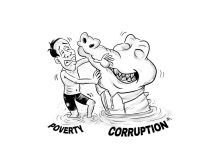
SHAME is stitched into Filipino life. A child forgets to say “po” or “opo” and gets called “walang hiya” or “walang modo.” A student caught cheating lowers his head as classmates whisper. Even in barangay basketball, a player who fakes an injury or flops is booed — not for the foul, but for the loss of respect.
Shame is a compass. Yet when the stakes are higher — ghost flood projects, bloated dredging, padded medicine deals — the compass suddenly spins, as if north has disappeared. What Karen Davila calls ““Kurakot shaming”” is a plea to reset that compass, to remind those in power that shame still counts.
The flood-control mess is not just about lost billions. It is about muddy classrooms in Pampanga, where teachers stack hollow blocks to hold classes above the waterline. It is about families in Calumpit, Bulacan, piling sandbags every storm while “finished” projects sit only on paper.
Budget records show allocations swelling from ₱141 billion in 2021 to nearly ₱350 billion in 2024. Still, the floods rise, mocking the numbers. Economist JC Punongbayan notes the paradox: bigger budgets, little relief. What people feel is not just anger but humiliation—being treated like fools with their own money.
That sting matters. Scholars like June Tangney explain the difference: guilt says, “I did something bad,” shame says, “I am bad.” In politics, shame deters. Richard Nixon resigned not only because of law but because Americans would not accept a shameless leader. In Germany, Chancellor Willy Brandt knelt in Warsaw to embody his nation’s shame, rebuilding trust.
Contrast that with leaders today who shrug off scandals and double down. Shamelessness has become armor. “Kurakot shaming” is meant to pierce that armor — not with cruelty, but with clarity: you broke trust, and it is disgraceful.
Celebrities have given this sting a face. Vice Ganda posted about reheated adobo in London, stung by taxes “pinagpipyestahan ng mga garapal na magnanakaw.” Anne Curtis echoed Jessica Soho’s words: greed, not floods, will sink us. Nadine Lustre mourned lost homes and pets while funds vanished.
Their value is not in moral authority, but in turning outrage into everyday pictures: cold food, wet slippers, ruined classrooms. They remind us corruption is not abstract; it seeps into dinner tables, barangay halls, and classrooms.
Shame, then, works like soap — disinfecting public talk.
But shame must be handled with care. Social psychology warns that wild shaming can backfire, driving denial instead of reform. We have seen politicians cry “political harassment” or file libel cases when cornered.
That is why shame works best when precise. Naming the project, the cost, the contractor, the missing wall — these details leave little room for excuses. When Bulacan residents say, “Wala kaming nakikita,” after a ₱77-million project, that is not slander. That is fact. (To be continued)/PN







